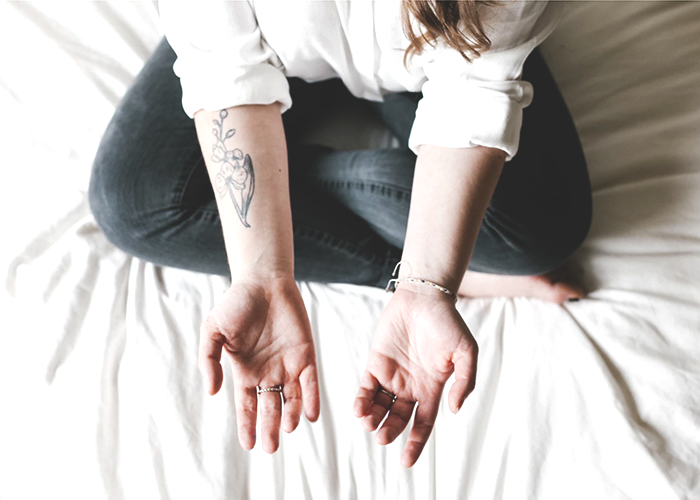5 Surprising Ways I Have To Budget With A Chronic Illness

I’ve never had a “normal period” in my life due to my chronic illness, Polycystic Ovarian Syndrome (PCOS). My periods are irregular, painful, and emotionally draining. When I received my diagnosis a few years back, I chose to change my lifestyle instead of taking hormonal birth control (for a few reasons), all of which led me to change how I live my life. Thus, it changed where I spent my money. In my journey to manageable periods, I’ve come up with a few rules for myself to keep my body and budget in check.
1. I spend my money on expensive, organic foods rather than eating out, coffee, or alcohol.
As a person who loves to cook and eat good meals, I don’t necessarily restrict myself in the grocery store. I prioritize buying the organic, locally grown items because I know it will be better for my hormones and my health. I also know that when I walk out of the grocery store, I won’t have many options due to my restricted diet (I am gluten and dairy free, with the added twist of following the FODMAP diet). This is essentially my time to SHINE with food. However, I balance it out with pre-planning my meals and making a list so I don’t buy foods I don’t need.
2. I buy my supplements and green beauty products items in bulk after doing research on the best value.
I buy all my personal products online at once, every six months. I do this for a few reasons:
(A) By avoiding dangerous ingredients in drugstore makeup, I can’t run to CVS to pick up a new mascara when it runs out. I have to order it online in advance, and I don’t have the patience for two-week shipping.
(B) I can control my impulse purchases and focus on my essentials with careful research and planning (I use my master green beauty excel sheet to help me keep track). By researching different brands and recommendations from my favorite green beauty bloggers, I find the good products. Plus, by planning, I am less likely to impulsively order products.
(C) I can wait for discounts. My go-to online store for products, Pharmaca, often sends their subscribers 30% discounts whole purchase orders. So, when I know I need to start ordering again, I look for their emails.
3. I switched to the menstrual cup instead of pads and tampons.
In addition to the tampon tax, pads and tampons are the costly and unhealthy option for me. They use a number of dangerous chemicals to soak up blood and are placed in a very sensitive part of my body. This isn’t my favorite. So, at the recommendation of a nutritionist, I switched to the Diva.
It was the best decision I’ve ever made in dealing with my actual period because on top of being the healthiest and most comfortable for me, it’s cheaper in the long run. The upfront cost of $40 for a Diva cup pays for itself within four periods ($8 per box of tampons, which cover me for about one period, times four periods = $40).
For my period, my menstrual cups tend to slip my first two days, I’ve also invested in Thinx (I was also really curious about them from all the hype). Either way, it’s all worth it, since I no longer have to panic if I’m out of pads or tampons on my first day.
4. I budget for therapy, nutritionist appointments, and yoga as essentials rather than discretionary.
All three of those are vital to my health and quality of life. With their support, I focus on my progress. I will never be cured of my PCOS, but I can alleviate the symptoms and thrive in spite of it. However, it takes a team. Therapy allows me to calm my anxiety and stress (which make my symptoms worse), yoga allows me to build strength through sweat and mediation, and my nutritionist guides me through my food restrictions and supplements. When I was at my worst, I promised myself to never take my health for granted because it affects all aspects of your life (socially and work wise). Investing in my health is non-negotiable.
5. I budget my time, and I can time off of work when I need it.
I am very lucky to be working for an organization with a flexible work environment. I don’t think I can live without one because I need time to recharge and rest. Before my period, I become extremely lethargic and introverted, which is why it is important to me that I am able to work. I can lay in bed and still be active without physically straining my body. When my period comes, I have extremely painful cramps, so I often need a day of rest. I’ve even taken an afternoon off to cook food that helps me feel better!
They know this. To get my best work, I need to feel good. So, by having the space to recharge and rest when I need it, is important to my work output and their bottom line.
*****
By following these guidelines, I am able to be my healthiest self, enjoy life, and even save a little!
Brooke is a full-time non-profit marketer, occasional writer, and year-round chronic illness sufferer.
Image via Unsplash




